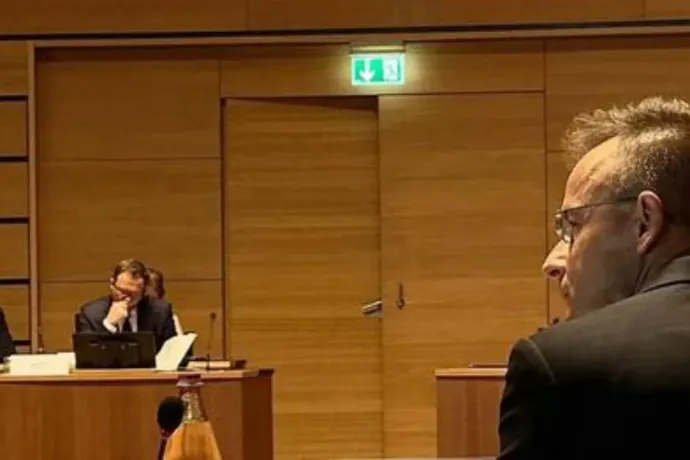
EU foreign ministers agreed at a meeting on Monday to spend the profits from frozen Russian central bank assets on ammunition and aerial defence systems, among other things, Politico reports, citing four diplomatic sources.
Josep Borrell, High Representative of the Union for Foreign Affairs and Security Policy said earlier that because of an earlier abstention, the Hungarian government "should not be part of the decision on the use of the money". He said this legal work-around was "subtle, like all legal decisions, but it works".
Péter Szijjártó, Hungarian Minister of Foreign Affairs and Trade, posted on Facebook at the beginning of the meeting: "more billions for Ukraine – now with breaking European rules, and Hungary left out".
However, EU officials told Politico that the Council's legal service argued that the Hungarian government cannot stop these payments because it abstained in a vote earlier this year and the reason allowing the work-around is that the funds do not come from EU taxpayers.
Contrary to what the Financial Times quoted Borrell as saying, they say that this is not because Hungary abstained from a decision in May to distribute the money for military and non-military purposes, but that it did so in March for a special fund for Ukraine. Szijjártó said then that it was not a "simple" abstention, but a constructive one, and that the price of Hungarian support was a change in the law, stating that Hungary would not bear any political or financial burden from the decision.
Constructive abstention is covered by the EU's quasi-constitution, one of the fundamental treaties, which is difficult to amend (there is a method that requires "only" a unanimous decision by the member states, but it is not easy to impose such a rule on the March case). On 19 March we asked the ministry, among other things, what exactly the rule is that is being changed and, if it is not an amendment to a fundamental treaty, how it can override the provisions of the treaty, and we have not received a reply since then.
In the case of constructive abstention, the country concerned "is not bound by the decision but accepts that it binds the Union. In a spirit of mutual solidarity, the Member State concerned shall abstain from any action which could conflict with or undermine Union action under the decision in question, and the other Member States shall respect its position." In such cases, the government concerned shall accompany its abstention by a declaration.
Politico points out that the money won't be used for reimbursements of shipments by the Member States, as is normally the case, but for direct purchases of ammunition and aerial defence systems. A quarter of the amount will be used for purchases from Ukrainian industries. According to the paper, countries had until 11 a.m. to voice their opinion, and none cast a negative vote, according to an internal Council message seen by Politico. The decision did not require unanimity, meaning that Hungary (which is “furious” because of the decision, according to a diplomat) was not able to block it.
The final figure of the amount of profits from the frozen assets of the central bank is still unclear, but diplomats said it ranges between €1.2 billion and €1.4 billion.
According to the paper, despite today's agreement, Hungary is continuing to block the payment of €6.6 billion from the fund.
Szijjártó calls what happened a shameless breach of the rules
Szijjártó said on Monday that the government had "abstained from the first vote" on the "use of the profits from the seized Russian assets". The "Council's legal service, Brussels, the bureaucrats and some member states thought that this was a sufficient basis" for "disregarding" the Hungarian government's right to decide. Thus, 'in disregard of its position, it was decided to use €1.4 billion of European Peace Facility funds to finance further arms shipments to Ukraine'.
Szijjártó said "this is a clear red line.
Never before has such a shameless violation and disregard of common European rules taken place. Moreover, it is precisely those who are pushing for the rule of law procedures at full force and talking about the endangerment of democratic values who are transgressing European rules".
According to him, "the self-anointed champions of democracy and the rule of law have now transgressed and flouted the rules in the most shameless way possible by excluding Hungary from this decision. The pro-war fervour has thus effectively blinded the decision-makers."
Our "EU legal team" in Brussels is investigating what action the government can take, he added. He saw it as a unanimous decision, and said that "exclusion" on the grounds of a "false" reference poses "serious legal risks" to EU decision-making as a whole in the long term.
Szijjártó said that the EU apparently wants to continue crossing the red lines, as evidenced by the fact that, according to the proposal of the High Representative for Foreign Affairs and Security Policy, Ukrainian soldiers could be trained in Ukraine, not only in other countries (the original mission was decided in November 2022). He considered this extremely dangerous, because it is "the first step" towards “the stationing, deployment and sending of European soldiers to Ukraine”.
This is "unacceptable to us and we will protest it with all means at our disposal, as the deployment of EU training staff in Ukraine would create another extremely serious risk of further escalation of the war", he said. (Participation in the missions is voluntary, with 24 member states and Norway offering training modules and trainers so far, according to the EU's foreign service fact sheet.)
For more quick, accurate and impartial news from and about Hungary, subscribe to the Telex English newsletter!